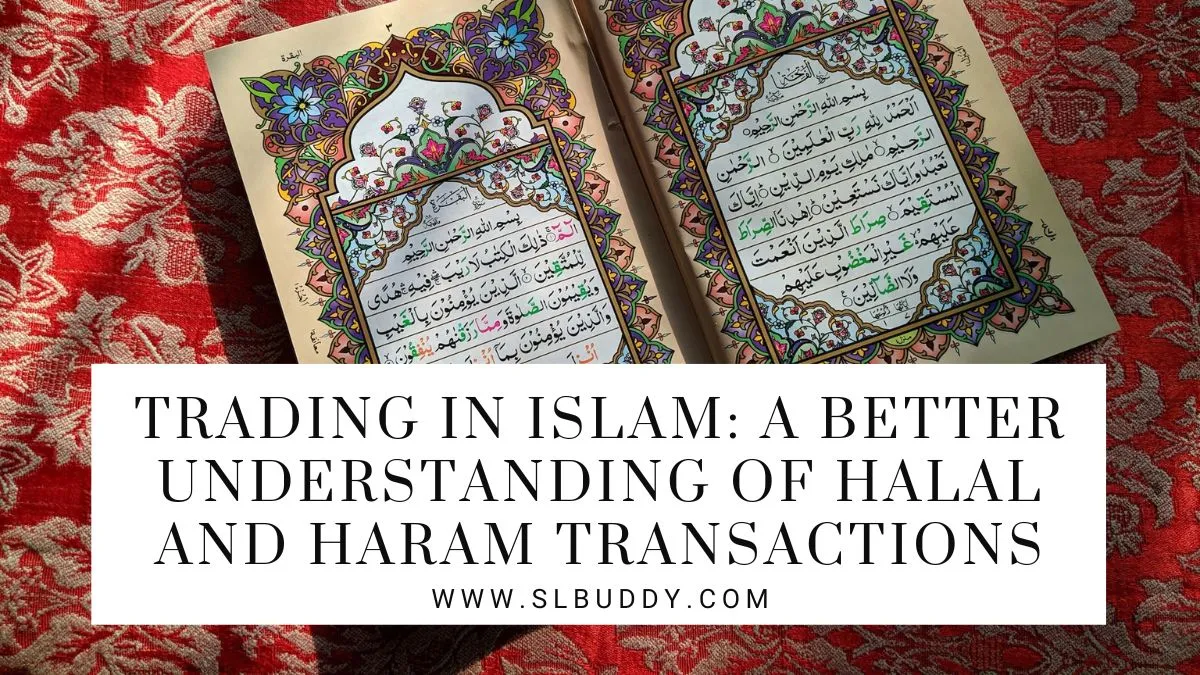
Islam is one of the world’s largest religions. It is also one of the world’s strictest religions.
The Sunnah, or the teachings, of the Prophet Muhammed, lay out each and every facet of everyday life for Muslim people.
Almost everything is covered in Muhammad’s Sunnah, from how to enter your house to how to divvy up inheritances.
Some financial matters are even discussed in detail in the Qu’ran, the Islamic holy book, equivalent to the Old Testament for Jews and the New Testament for Christians.
This post will explore trading in Islam, explaining how halal transactions work, and discussing what’s considered haram.
Is Stock Trading Halal?
Stock trading is halal. However, it is only so for Muslims if the companies they are investing in engage in halal practices and do not involve themselves in usury, the distribution of alcohol, or anything else that’s not permissible in the religion. For Muslim investors, there are indexes online that show the names of all businesses that practice halal business, making it easier for them to ensure that they do not end up investing in a business that goes against Islam’s teachings.
If a Muslim were to invest in something that goes against the religion’s teachings, the money earned would be entirely haram. If money is considered haram, it is no longer usable.
Muslims that continue to use money that has been earned in a haram way are, according to the religion’s teachings, punished in the akhira, or the afterlife.
It is very important, therefore, for Muslims to make sure that they make money for themselves in halal ways.
If you are a Muslim, then this is likely something that you already know well, and something you have been told your entire life, or since your conversion.
Ignorance Is Not a Defense
Something that’s beautiful about Islam (and something that is not present in many other religions) is that if a Muslim commits a haram act without knowing what they are doing is haram, they are not punished.
For example, during the Ramadan fast if a Muslim wakes up and drinks or eats without remembering it’s Ramadan, it’s as though food never passed their tongue.
The same is true in relation to trading. If Muslims satisfy themselves that a company is not practicing haram business and invests with them, then later discover they are, they have not committed a sin.
It is very important, even though Islam’s teachings protect people who make genuine mistakes, to make sure that if you are a Muslim, you thoroughly research each and every trade you are going to make.
By doing this, you will be able to ensure that you do not end up investing in something that’s not permissible for you to invest in.
If you do end up investing in something that’s haram and discover it to be so, you must immediately withdraw and terminate your trades. This will help you to continue to live a halal lifestyle.
Using Haram Money
In Islam, purchases made with haram money are worthy of punishment. If a person buys themselves food with haram money, then that food will not be blessed to their body.
People have compared eating food bought with haram money to consuming hellfire. It is therefore very important for Muslims to make sure that the money they are making and spending is entirely halal.
It’s not easy to do this in the modern world when companies are involved in many different ventures and have subsidiaries and smaller organizations working underneath them.
Before you make trades, again, make sure that you take some time to research specific companies and ensure that they are practicing halal business.
Indexes, as noted above, can help you to do this. It’s very important to make sure that in addition to using these indexes, you conduct your own research, though.
You should also read about how profitable companies are (and how profitable they are going to be in the future) so that you don’t end up sinking your money into a company that has no future and cannot generate money for you.
Differences of Opinion
Islam is a big religion. There are many different schools of thought. In mainstream Sunni Islam, there are four major madhabs, and a fifth unofficial one.
A madhab is a school of thought. These madhabs are Hanafi, Shafi, Maliki, and Hanbali.
The unofficial fifth madhab is Salafi. Different scholars have different understandings and interpretations of whether trading is permissible or not.
The general, mainstream consensus is that trading is permissible. However, some scholars say that it is not.
The reason that some scholars say that trading is not halal is because there are some hadiths that give the impression such activities would not be, were Prophet Muhammed still alive.
The main hadith reference in relation to trading’s haram status (among scholars who believe trading to be haram) is the one where Muhammed says, “Do not sell that which you do not possess.” If you are day trading, you do not own the underlying asset that you are trading, which would therefore make it haram.
However, there are some styles of trading that you can perform that allow you to own the underlying asset, so it is possible to get around this hadith and the verdicts of scholars who quote it.
Day trading is, in truth, one of the riskiest forms of trading anyway, and is best avoided.
Trading Responsibly
No matter which religion you subscribe to, make sure that you always trade responsibly.
Take some time out of your day to conduct extensive research prior to making trades.
Conducting research prior to making trades will help you to make more informed ones and prevent you from wasting your money.
Always research companies before buying their shares or stocks, too. Researching companies will help you to prevent yourself from accidentally investing money in a sinking ship.
Every trade you make needs to be rooted in research and good judgment.
Don’t miss: How To Secure Your Business From Online Threats
The bottom line
Despite Islam’s many rules, it is a beautifully simple religion. If you subscribe to it, you need to make sure that everything you do is done for it.
You also need to avoid committing sins. Trading is generally considered halal in Islam and is therefore permissible for you.










